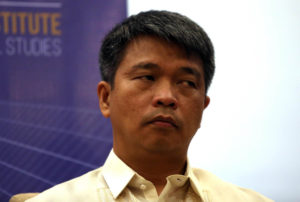Malacañang on Wednesday appealed to critics to unite with the Duterte administration on its policy on the West Philippine Sea.
Presidential spokesperson Harry Roque said the critics were not the only ones who had the Philippines’ best interest in mind.
Legal experts and academics have challenged the administration’s plan to undertake a joint exploration with China in the West Philippine Sea, which the President has likened to “co-ownership.”
The areas being considered for exploration are in the West Philippine Sea, waters within the country’s 370-kilometer exclusive economic zone (EEZ) in the South China Sea.
Appeal to critics
“We appeal to the critics, we have to be united on this issue. Please do not claim to have a monopoly of upholding the national interest. Philippine President Duterte has been consistent that he will die for Philippine territory, but meanwhile he will not sacrifice even a single life for an issue that can be resolved on the basis of friendly relations,” Roque said in a press briefing in Puerto Princesa City, Palawan province.
According to him, Mr. Duterte maintains that the West Philippine Sea and the islands that the Philippines occupies and claims are parts of Palawan, save for Panatag (Scarborough) Shoal, which is part of Zambales province.
“The President has said that he will not surrender any inch, even a single inch, of Philippine territory to any foreigner,” Roque said.
Mr. Duterte’s position, he said, is that the UN-backed Permanent Court of Arbitration in The Hague has ruled that China cannot lay claim to “any waters of” the West Philippine Sea on the basis of historic title or on the basis of the so-called nine-dash line—dashes on Chinese maps demarcating China’s claim to nearly all of the South China Sea—and that the areas where China has built artificial islands are part of the Philippines’ EEZ.
‘Land territory’
But Mr. Duterte also holds that the reality is that the Philippines is facing an unresolved controversy concerning “land territory,” as the arbitral tribunal’s ruling concerns only the law of the sea.
“So the issue of land territory remains disputed, that is why we still have to refer to it as the ‘disputed islands of the West Philippine Sea,’” Roque said, adding that the arbitral tribunal’s ruling did not cover the islands.
The question of the islands would have to be resolved through negotiation and diplomacy, he said.
“That is why the President has for the time being, pursued friendly relations with China in contrast to the antagonistic position taken by his predecessors,” he added.


